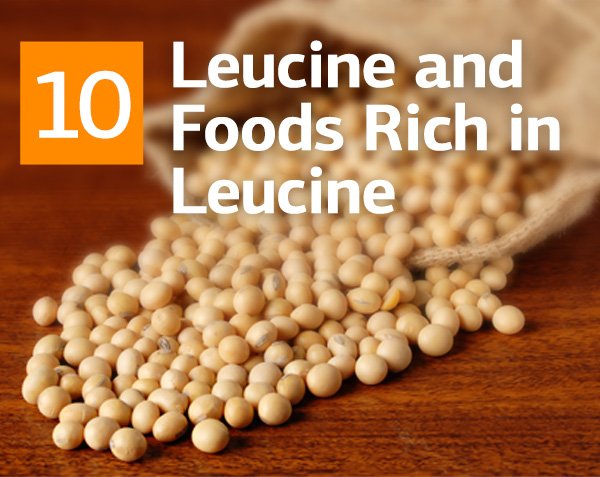Leucine and Foods Rich in Leucine
Leucine is an essential amino acid, which the human body cannot synthesize, and therefore it must be ingested, usually as a component of proteins. In plants and microorganisms, leucine is synthesised by a series of enzymes. Leucine is utilized by the liver and muscle tissue. It is the only dietary amino acid that has the capacity to stimulate muscle protein synthesis which is prevents degradation of muscle tissue. However, continuous leucine supplementation does not increase muscle mass or strength in men, so the results of leucine researches turn out to be conflicting. Still, leucine remains the most important amino acid for muscle building and for this reason is quite popular amongst athletes. It also maintains nitrogen balance and enhances thinking abilities which can decline as physical activity becomes more intense.
It proves to be difficult to estimate the daily requirement for the indispensable amino acids, the same goes for leucine. Numbers constantly undergo considerable revision, and the latest data state that the minimum daily intake of leucine for adult equals 16 mg per 1 kg of body weight, while for children from three years and older it must be 10-20% higher.
The most substantial quantities of leucine can be found in such foods as soybeans, peanuts, beef, pork, fish, wheat germs, almonds and eggs.
Interaction of Leucine with Other Nutrients
Leucine closely interacts with the other branched-chain amino acids, namely isoleucine and valine. Their cooperation is directed to repair muscles, regulate blood sugar and provide body with energy. These processes cause growth of specific hormones which burn visceral fat which is located in the deepest layers of the body and is almost unresponsive to dieting and exercises. Leucine is converted into glucose during intensive workouts to prevent the body to use muscle tissue to gain energy. Vitamin B6 can successfully counteract the consequences of the leucine excess (namely, pellagra disease). Also, excessive intake of leucine may lead to vitamin B3 (niacin) deficiency.
Leucine may increase sematropin (human growth hormone) secretion which leads to slowing of the ageing process, decrease in body fat and increase in muscular mass.
Deficiency of Leucine
Leucine is one of the nine essential amino acids human needs to survive. Deficiency of leucine mostly occurs due to the poor diet, when people do not ingest it in required daily amount. It leads to such consequences as constant fatigue, irritation, dizziness, headaches, hypoglycaemia and other, even though these symptoms take a while to manifest.
Dietary Toxicity Of Leucine
Leucine toxicity causes delirium and neurological compromise, as seen in maple syrup urine disease (MSUD), and can be life-threatening. Some studies claim to observe liver hyperactivity due to taking supplemental leucine. Excess leucine may be a cause of pellagra (niacin deficiency), whose main symptoms are "the four D's": diarrhoea, dermatitis, dementia and death, though the relationship remains to be explored.
Foods Rich in Leucine
1. Soybeans and Soy Products
.jpg)
| Soybeans, mature seeds | |
| 100 g | 1 cup (186 g) |
| Leucine: 2.97 g (248% DV) |
Leucine: 5.5 g (460% DV) |
Soybeans are among the most widely known and nutritionally beneficial legumes on earth. Mature soy bean (2.97 g/100 g) and its products, especially soy protein isolate (4.9 g/100 g) are abundant sources of leucine. Not only do soybeans provide protein, omega-3 fatty acids and vitamin K, they also have one of the highest amounts of leucine among all natural food sources. Soybeans are available in many forms including dried, canned or fresh. Fresh soybeans usually can be found at the Asian supermarkets.
2. Meat
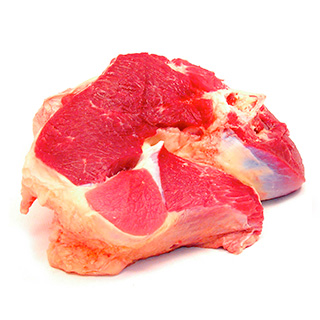
| Beef, Tenderloin, Steak, Separable Lean Only, Trimmed To 1/8 Fat | |
| 100 g | 1 lb (454 g) |
| Leucine: 1.76 g (147% DV) |
Leucine: 8 g (667% DV) |
Meat like beef, pork and cured meats are good sources of the amino acid, and can provide around 1.76 g of leucine per 100 g portion. What is less attractive about them is that they are rich in saturated fats (especially pork) and cannot be regarded as a part of a healthy diet. To eat or not eat – that is the question.
3. Poultry
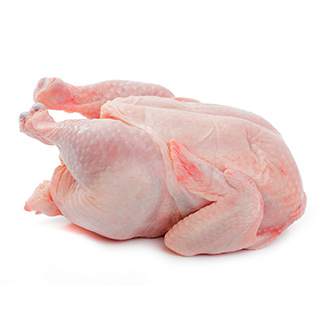
| Chicken, Broilers Or Fryers, Light Meat, Meat Only | |
| 100 g | 1 chicken, bone and skin removed (147 g) |
| Leucine: 1.48 g (123% DV) |
Leucine: 2.2 g (183% DV) |
Chicken is one of the best sources of leucine, it provides 1.48g/100 g leucine per serving. It is also low in fats, if cooked skinless, but high in proteins and selenium. Of course, frying is not the best way to preserve poultry benefits.
4. Fish

| Salmon, pink | |
| 100 g | 1 fillet (318 g) |
| Leucine: 1.62 g (135% DV) |
Leucine: 5 g (429% DV) |
All fish are a good source of leucine, especially pink salmon (1.62/100 g). Canned light tuna provides ~3.5 grams in 1 cup of tuna chunks; salmon and haddock, for instance, give about 3 grams of leucine in an average-sized portion. Other fish that belong to rich leucine sources include whitefish, tilefish and trout.
5. Shellfish
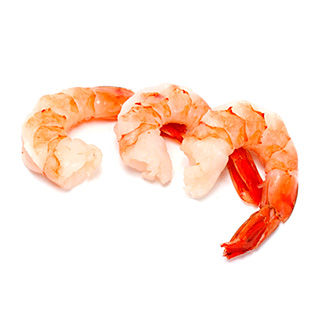
| Crustaceans, shrimp, mixed species | |
| 100 g | 1 medium (6 g) |
| Leucine: 1.6 g (133% DV) |
Leucine: 0.09 g (7% DV) |
Shellfish, like shrimps, can be easily included in children’s diet and contain 1.61 g of leucine per 100 g serving. They are high in proteins and nutrients, but low in calories, which makes them a desirable additive to the everyday diet.
6. Eggs

| Egg, whole, fresh | |
| 100 g | 1 medium (44 g) |
| Leucine: 1.1 g (92% DV) |
Leucine: 0 g (40% DV) |
Whole eggs and egg whites are excellent sources of leucine: one whole fresh egg contains about 1.09 g of this amino acid, while white of one egg 1.02 g. According to the recent studies, leucine in eggs provides a metabolic advantage when trying to lose weight, as leucine appears to help burn fat. However, only eating eggs will not help you to lose weight, it is advised to contribute by eating high-quality proteins as well as limiting carbohydrates, too. If you are concerned about cholesterol content in eggs but still want the leucine they contain, eat egg whites alone.
7. Nuts
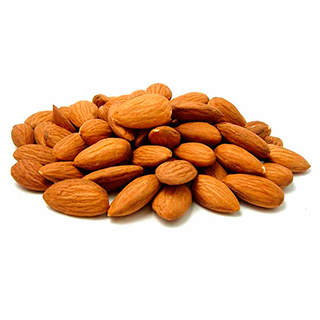
| Nuts, almonds, blanched | |
| 100 g | 1 cup whole kernels (145 g) |
| Leucine: 1.5 g (125% DV) |
Leucine: 2.2 g (181% DV) |
All nuts, especially almonds (1.5 g/100 g) and peanuts (1.67 g/100 g) are an outstanding source of amino acids. Adding nuts to your menu gives body literally a power boost. Packed with proteins, essential fats, fibre and various vitamins (depending on what kind you prefer), they perfectly match a healthy lifestyle. Though, most beneficial are unsalted nuts.
8. Seeds
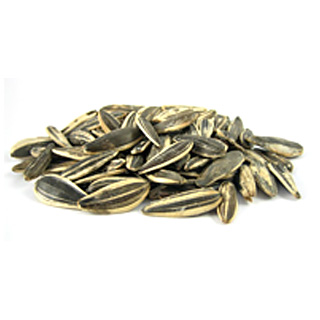
| Sunflower seed kernels, dried | |
| 100 g | 1 cup, with hulls, edible yield (46 g) |
| Leucine: 1.7 g (142% DV) |
Leucine: 0.78 g (65% DV) |
Seeds are rather inconspicuous – a lot of people have never properly tried them. However, they are full of various nutrients like iron, omega-3 fatty acids, fibre, vitamins, etc. So if you want to enhance your general health condition as well as to improve its leucine content, consider flax and sesame seeds as your everyday snack from now on.
9. Legumes

| Lentils, pink | |
| 100 g | 1 cup (192 g) |
| Leucine: 1.8 g (150% DV) |
Leucine: 3 g (288% DV) |
Lentils, chickpeas, beans, and cow peas are good sources of leucine, especially for vegans. They also host an abundance of protein and fibre while delivering relatively small amount of calories. Another their advantage is a wide range of varieties to pick from.
10. Milk and Dairy products

| Milk, whole, 3.25% milkfat, with added vitamin d | |
| 100 g | 1 cup (244 g) |
| Leucine: 0.3 g (25% DV) |
Leucine: 0.8 g (67% DV) |
Sheep's milk is the best source of leucine, followed by goat's milk and cow's milk. Milk is an indispensable part of a healthy diet (of course, if you are not allergic), especially for the children. A cup of milk provides a growing organism with fats, proteins, carbohydrates, vitamin D, calcium, choline, potassium and many other beneficial nutrients.
Dairy products are a particularly good source of leucine because they are high in protein. For example, 1 cup of non-fat cow's milk provides 0.8 g of leucine and slightly more if it's protein-fortified or has non-fat milk solids added. Most types of cheese are also superb sources of leucine: for instance, a 1-ounce portion of Edam, Colby, cheddar or blue cheese provides from 0.5 g to 0.7 g of leucine, while Parmesan holds even higher amount of this amino acid, with about 1 g per ounce of hard cheese. Different kinds of yoghurt contain moderate amounts of leucine as well, with about 1 g per 6-ounce serving.
